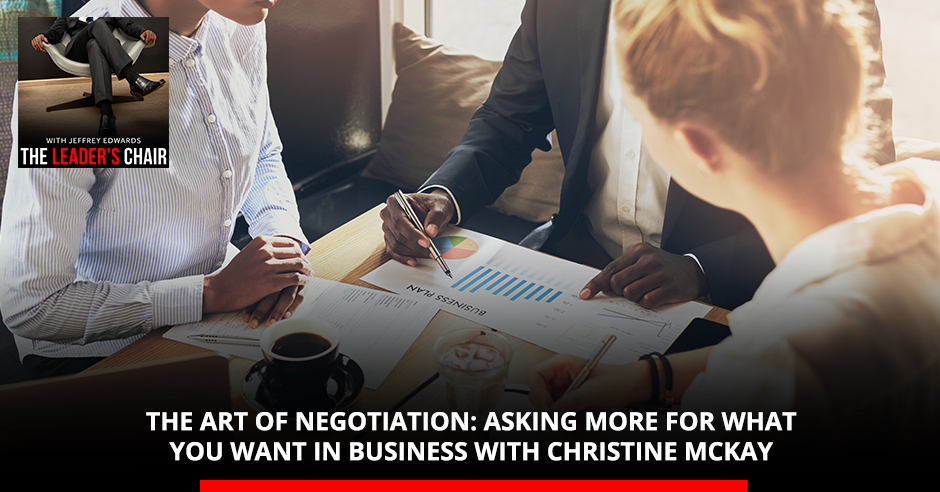
A crucial part of being a business leader is knowing how to negotiate. It’s where opportunities get tapped, deals are made, and relationships are created.
So how do you become a good negotiator? In this episode, I speak with global business negotiation strategist, Christine McKay, to learn the secrets to becoming a great negotiator.
About Christine McKay
 Christine McKay launched Venn Negotiation to help others find common ground and resolve complex issues. With 26 years of experience negotiating with dozens of Fortune 500 companies, she expertly turns the non-negotiable into negotiable. Her years of experience allows her to accelerate the negotiation process for clients, and educate others.
Christine McKay launched Venn Negotiation to help others find common ground and resolve complex issues. With 26 years of experience negotiating with dozens of Fortune 500 companies, she expertly turns the non-negotiable into negotiable. Her years of experience allows her to accelerate the negotiation process for clients, and educate others.
Christine frequently speaks on a broad range of negotiation-related topics, and has served as an Adjunct Professor at Bentley University.
Check out this episode if you want to learn:
- Which tools you need to become a top negotiator
- Why you need to think about your counterpart as much as yourself
- How to negotiate from a place of abundance
🎧 Listen to the podcast here:
The Art Of Negotiation: Asking More For What You Want In Business With Christine McKay
How did you get to where you are today?
I was born and raised in a small town of 550 people right on the Alberta and Montana border, (where) I had a successful high school career, (graduating) with the same 20 kids I started kindergarten with. I was a beauty queen, (and) the most outstanding speaker (in) public speaking and debate. (On top of that) I was an international exchange student, an honor student, and I was voted most likely to succeed for my class.
'We convince ourselves of what we can't do without giving ourselves the opportunity to ask for what we want.' Share on XI left home when I turned 18, and started at the University of Montana in Missoula. (From there) it didn’t take long before I found out that I was pregnant; I wasn’t married and I lost my job. (In) January of 1985, I got evicted from the trailer that I was living in (and) started living in the back of my 1972 Chrysler Newport with my black cat, Athena.
I can’t imagine how difficult that must have been.
I decided that I wasn’t capable of making decisions for myself. (Then) I broke all my trophies, smashed my tiara because I said that I didn’t deserve it. I met a guy who I thought was a nice guy, (who) turned out not to be a nice guy, (and) I abdicated my decision-making over my own life to him.
He was more than happy to assume that responsibility, (but) unfortunately, he didn’t follow through with it. I had three kids at the age of 22, and I wasn’t allowed to work (or) to get an education. He wasn’t supporting us. We did all our grocery shopping at the food bank, (and) people brought us food and clothes for our kids. We boiled water on the stove in order to bathe the kids in the dead of winter.
One day, my oldest daughter was hungry for lunch, and all I had to feed her was a can of tomato soup, and she hated tomato soup. She started throwing a temper tantrum. I shoved her entire little body into the cupboard, to try to show her that I didn’t have anything else to feed her.
I decided then that was it. He was an aggressive man. I took a risk and decided I was going to go to community college, and I did, (getting) a 4.0 GPA, and was awarded a scholarship to Rensselaer Polytechnic Institute.
I took my daughters and we moved from Western Massachusetts across the mountains to Troy, New York, (and) became the first woman to graduate from Rensselaer as both a full-time student and a single mom.
That launched me on this amazing career, where I started working for what’s now Verizon. I found an opportunity to start working in international mergers and acquisitions.
Thankfully, (I had) remarried at this time (to) the man of my dreams. We had our 27th anniversary this year (2020). He’s a remarkable person, and he’s super supportive — the exact opposite of everything that my first husband was.
It sounds like your career was sky-rocketing, too!
I started doing international mergers and acquisitions work in Southeast Asia, and Eastern and Western Europe. I was negotiating billion-dollar deals with ministers of finance and telecommunication (companies). It was a crazy amazing time, (and) I realized I needed an MBA. I applied to one school, and my daughters got this little teddy bear with a little T-shirt that said ‘HBS’ on it. That was the day that I got my MBA from Harvard Business School.
I’ve (always) been passionate about negotiation, and I’ve found a way to make it part of every job I’ve ever done since I graduated from business school. My parents are small business owners, as (I’ve) worked with Fortune 500 after Fortune 500.
How do the two differ in their negotiations?
Small businesses simply do not have the same amount of leverage. They do not have the ability or the knowledge to negotiate for more of what they want. I launched Venn Negotiation out of that passion for helping small businesses level the playing field. We do a lot of work with smaller companies who are in what I affectionately call (the) ‘David and Goliath’ negotiation.

Art Of Negotiation: Small businesses simply do not have the same amount of leverage and the ability or the knowledge to negotiate for more of what they want.
We negotiate on behalf of many of our clients, but we also have educational programs so that people can learn to negotiate in a different way. (Our) approach is practice-oriented, interactive and creative.
7-year olds to 13-years olds are the best negotiators. They know what they want, they demand it (and) don’t apologize for it. As we get older, that changes, and many people are terrified of negotiating.
We’re focused on trying to help people get more comfortable (with) asking for more, and then showing them how to get it.
The impact you’ve had is inspirational. It sounds like part of that journey included learning to negotiate with yourself, saying, ‘I can do this, I can do that’.
There’s a professor out of Columbia who released a book called Ask for More. She’s the first person I’ve seen talk about the concept (that) the hardest negotiation is the negotiation which we have in our own head.
People negotiate against themselves before they’ve ever even engaged with a counterpart. Whether they’re looking for a new job and want a higher salary, they’ll say to themselves, ‘That might be a little too much. I’ll take that back a little bit.’
We tell ourselves all the time, ‘I’ve got to have this deal, this account.’ We convince ourselves of what we can’t do without giving ourselves the opportunity to ask for what we want. That negotiation we have with ourselves is something that we fight with constantly.
In your work with small business owners, what are some of the stepping stones that you see them having to go through to become more comfortable with negotiating?
Big companies don’t do a good job of this, either — we give them a lot more credit and power than we need to.
One of my mentors is a gentleman named Blair Dunkley, out of Edmonton. We focused on the high-level thing of what we want, (and) we define it in terms of price. Price is an output of assumptions.
'If we negotiate assumptions, then price becomes an output of the negotiation, not an input.' Share on XIf we negotiate assumptions, then price becomes an output of the negotiation, not an input. In order to be able to do that, you have to have clarity. Without clarity of what you want, you lose the ability to manage the conversation, because negotiation is a conversation. It’s a relationship.
‘If you don’t have a destination in mind, any road is going to get you there.’ The same is true with your negotiation. Having clarity around what you want and why it’s important is critical, and that comes down to preparedness.
Have that understanding down to what my grandmother calls the ‘gnat’s ass’ level detail — even things that you think are not important, because they could be the most important thing to your counterpart.
Where do people usually trip up the most, when it comes to negotiating?
(People) constantly think about negotiation in terms of themselves only. That’s the other big challenge that people need to overcome: (thinking about how it will) impact your counterpart. At the end of the day, we’re all in business. How do you create an environment that allows you both to generate more profit, without sacrificing the things that are important to you?
If you think about it as a circle, and (the) circle represents 100%, people look at the circle and say there’s 100% value. How do we divide the circle up in the deal?
What research (in Europe) shows is that (the) 100% that we see, there’s 42% more value often available to us that nobody at the table is even observing. We’re (so) focused on what it is that we want, that we’re not looking at what is possible.
That’s the importance of understanding what you want, and how it translates to your counterpart.
It sounds like there are a lot of missed opportunities that happen on a regular basis, from both sides.
We tend to negotiate from a position of scarcity, instead of a position of abundance.
If you’ve got three parties and one egg, and everybody wants the egg, people think, ‘I’m going to smash the egg, and nobody’s going to get anything.’ Two people are going to walk away without the egg, and one person’s going to get the egg.
What happens if you take a pen, you poke a hole in the egg, you drain the egg, and you separate the yolk from the white? Through the course of the negotiation, (you find out) that one of you wants the shell because you’re an artist and you make amazing egg art. You are making a soufflé, and you need egg whites. Maybe (someone else is) doing an egg wash, and needs the yolk.
We don’t often ask good enough questions to get us to the point of understanding, like: ‘I don’t have to smash the egg, (or) cut it in thirds and assume that everyone’s going to get an equal part.’
That’s a great metaphor.
We all want the egg for a different reason. What’s the reason? That’s how you create additional value.

Art Of Negotiation: Without clarity of what you want and an understanding of why things are important to you, you lose the ability to manage the conversation.
Most people do not ask good questions when it comes to negotiation — they ask the question of death in every negotiation, which is ‘why’. (It puts) the respondent on the defensive, because you’re implying that there is a better way of doing it.
If you ask ‘what’ and ‘how’ questions, that will get you a lot more information from which you can build a deal. You get specificity, (which) leads back to this clarity around knowing what you want, and why it’s important to you.
The more specific you are, the easier it is for you to create opportunities of abundance for your counterparts, so that you can see where that additional 42% of the value (is).
I imagine it’s best if you catch people at the early stages of their career, so they can use these techniques moving forward.
When you were a child, you learned how to negotiate, how to ask for something, (and) how to influence others. Some threw temper tantrums, (others were) super sensitive, (or tried) to play both sides of the equation.
Many of us are still using those same styles of negotiating, (but now,) they’re not working as well as they used to. As adults, the thing that makes you an amazing negotiator is learning how to use all those different styles in different ways, and at different times, but nobody teaches (us) how to do that.
I was talking with a gentleman who is in his mid-70s. He said to me, ‘Christine, my wife hates how I negotiate,’ because he is an aggressive, value-taking negotiator. In our world, we call those ‘champions’: they’re champions for themselves, they see negotiation as a battle. They go into it armed and armoured, (and) are all about annihilating their opponent.
His wife is the exact opposite — she hates conflict. ‘Bookends’ is what I call them, because they’re at two ends of the extreme. The guy said, ‘I realize that I’m mean in my negotiation, and I don’t want to keep being mean.’ At 76-years old, he recognized finally that that style isn’t serving him as well as he thought it was.
Good for him!
I talked to a gentleman who came to the United States with $1,500 in his pocket, (and) parlayed that into a $100 million business. They do carpet cleaning for mold and fire damage, etc. He went from doing his business out of the back of his Volvo to having over 100 franchisees in North America.
Our discussion was, ‘How do you identify your franchisees, and what are the most important factors (when) you’re negotiating with them?’
'We're so focused on what it is that we want, that we're not looking at what is possible.' Share on XHe’s working with people who’ve suffered catastrophic damage to their home from floods, fire, hurricanes. He needs somebody who’s got compassion — that champion style, he won’t do business with. He’s like, ‘I’ll get up and walk away.’ (His counterparts) will have lost that business without even knowing why.
Leaders think about their negotiation in a way that is not (just) about getting what they want, but also about what they give to their counterparts, and how that creates a better ecosystem as they grow their businesses.
There’s a generational trend happening, too — Millennials and Gen Z are choosing employers whose value systems they align with.
Generational values can be applied to a large percentage of a certain demographic. Chris Voss, (in) his book, Never Split the Difference, recognizes that negotiation is inherently personal. I’m Gen X, and we value self-reliance, hard work, and not asking for help. Those are not the same things that Millennials and Gen Z value. They have other things like social consciousness, equality, social justice, and environmental causes.
There’s a woman named Cheri Tree who has this methodology called BANK (which) I like because it talks about value systems. Are you somebody who values status, (or) the scientific method, (or) community? Are you somebody who values structure and tradition? There’s a lot more to it, but those things influence how we negotiate.
I’m a huge student of all things. Where am I strong, where am I weak? That influences and benefits me as a negotiator, by having that understanding.
You mentioned the moment with your young daughter in your kitchen. What was the tipping point that pushed you in another direction?

Art Of Negotiation: Leaders understand how to think about their negotiation in a way that is not just about getting what they want, but also about what they give to their counterparts.
I’ve had many tipping points. When I got to business school, my ex-husband decided to sue me for custody of my kids. The demanding nature of Harvard Business School made it impossible for me to provide proper care to my kids. That was a terrible negotiation that I did with myself. I believed that I was up against a society that said to me as a mom, ‘You can be successful, but there’s this imaginary line. If you cross that line, I’m going to take your kids away from you.’
I put the brakes on. (Later), I worked for a company, (where my) friend who was the COO (said), ‘Christine, you try too hard.’ I was like, ‘What does that mean? Trying hard is a good thing.’
I had negotiated with myself in a way that said, (as a result of) this custody thing, I wasn’t allowed to be at the head of the table. People kept reinforcing that. (My friend) said that to me, and it hit me — I was like, ‘I’m done with that.’
After that, I started Venn Negotiation (with) this newfound strength, and (now), I feel like I’m living in my power. I want to help other people experience that, because it’s an amazing thing. Once you have it and you’re living in it, it’s like, ‘Why wasn’t I doing this many years ago?’
How do you help small businesses with negotiation?
We’re doing a lot of contract renegotiation work for small businesses, with respect to their landlord’s suppliers. There are many supply chain issues, because of the pandemic (as well as) tariffs (in the US). Small businesses are struggling to service their customer base. We’re helping a lot of those companies negotiate and renegotiate those relationships.
We’re launching a new training program that we’re calling Venn Masters, which is essentially Toastmasters for negotiation. It’s six weeks, and every session is two hours for the first level. It’s an experiential negotiation program.
'Most people ask the question of death in every negotiation, which is why.' Share on XWe start to put into people’s minds that there is a different way of thinking about negotiation. We come back and we debrief, and we’ll have more education from that perspective. I’m super excited about that — it’s a revolutionary way of teaching negotiation.
📌 Important Links:
- Christine McKay
- ‘Ask for More’ by Alexandra Carter
- Blair Dunkley
- ‘Never Split the Difference’ by Chris Voss
- Cheri Tree
Love the show? Subscribe, rate, review, and share!
Join The Leader’s Chair Community today on Facebook and Twitter.





